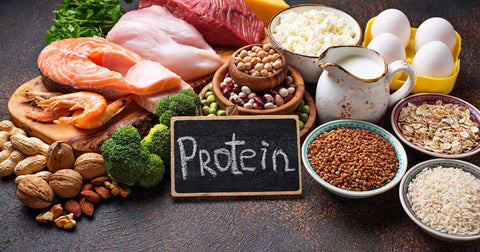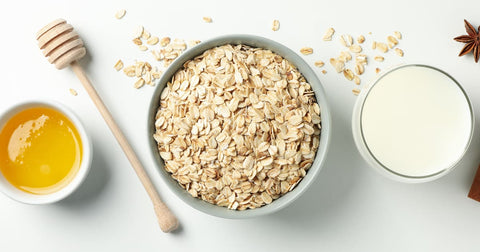Proteins are the workhorses of your body, responsible for everything from building and repairing tissues to supporting immune function and transporting oxygen. But have you ever wondered what makes up these essential molecules? The answer lies in the fascinating world of amino acids, the building blocks of protein. Let's explore what amino acids are, their different types, and how they contribute to your overall health.

The Building Blocks of Proteins: Amino Acids Unveiled
Imagine amino acids as the individual beads on a necklace. When strung together in specific sequences, they create a unique protein with a specific function. There are 20 different amino acids that your body uses to build proteins, each with its own unique chemical properties.
- Essential Amino Acids (EAAs): Your body cannot produce these nine amino acids, so you must obtain them from your diet. They include:
- Histidine
- Isoleucine
- Leucine
- Lysine
- Methionine
- Phenylalanine
- Threonine
- Tryptophan
- Valine
- Non-Essential Amino Acids (NEAAs): Your body can synthesize these 11 amino acids, meaning they don't need to be obtained directly from food.
- Conditionally Essential Amino Acids: These amino acids are usually non-essential, but under certain circumstances (like illness or stress), your body may not be able to produce enough, requiring dietary intake.
What are EAAs? The "Elite" Amino Acids
Essential amino acids (EAAs) are often in the spotlight due to their importance in muscle building and repair. Among them, the branched-chain amino acids (BCAAs) – leucine, isoleucine, and valine – are particularly crucial for muscle protein synthesis.
- The BCAA Buzz: Many athletes and fitness enthusiasts supplement with BCAAs, believing they enhance muscle growth and recovery. However, more research is needed to confirm these claims.
Best Amino Acids: Prioritizing a Balanced Diet

The best way to ensure you're getting all the amino acids you need is through a well-rounded diet. Focus on high-quality protein sources like:
- Meat (lean cuts)
- Poultry (skinless)
- Fish
- Eggs
- Dairy products (yogurt, milk, cheese)
- Legumes (beans, lentils)
- Nuts and seeds
- Whole grains (quinoa, brown rice)
By eating a variety of these foods, you'll naturally get a full spectrum of amino acids, both essential and non-essential.
L Amino Acid vs. D Amino Acid: The Mirror Image Mystery
- Mirror Image Molecules: Amino acids come in two forms: L (levo) and D (dextro), which are mirror images of each other.
- Life's Building Blocks: L-amino acids are the primary type used to build proteins in living organisms.
- D Amino Acids: While less common in nature, D-amino acids do have some functions in the body, but their role is less understood.
Amino Acid Complex: All-in-One Supplements
If you're looking for a convenient way to boost your amino acid intake, consider an amino acid complex supplement. These typically contain all 20 amino acids, both essential and non-essential. However, remember that getting your nutrients from whole foods is always the best approach.
Food Intolerance: A Hidden Obstacle to Protein Absorption

If you're experiencing digestive issues or not seeing the expected benefits from a high-protein diet, a food intolerance could be the culprit. Sensitivities can interfere with nutrient absorption and lead to a range of uncomfortable symptoms.
Uncover Hidden Triggers:
Our food intolerance test kit can help you identify which foods might be causing problems. By eliminating those triggers, you can improve your gut health and ensure you're absorbing all the essential amino acids your body needs.
The Takeaway
Amino acids are the fundamental building blocks of proteins, essential for countless bodily functions. By prioritizing a balanced diet rich in protein from various sources, you can ensure your body has the tools it needs to thrive. Don't let hidden food intolerances stand in the way of optimal health. Take charge of your diet and discover a healthier you.
Frequently Asked Questions:
1. I've heard a lot about essential amino acids (EAAs). Why are they so important?
Essential amino acids (EAAs) are the nine amino acids your body can't produce on its own, making them essential to obtain from your diet. They're crucial for a variety of functions, including building and repairing tissues, producing hormones and enzymes, and supporting a healthy immune system.
2. What are the best food sources of essential amino acids?
Animal products like meat, poultry, fish, eggs, and dairy are considered complete protein sources, meaning they contain all nine essential amino acids. However, you can also get all your EAAs by combining various plant-based proteins, such as beans and rice or lentils and whole-wheat bread.
3. Should I take an amino acid supplement?
In most cases, a balanced diet provides all the amino acids you need. However, athletes or those with specific dietary restrictions might consider supplements under the guidance of a healthcare professional or registered dietitian.
4. Can food intolerances affect my body's ability to absorb amino acids?
Yes! If you have a food intolerance, it can trigger inflammation in your gut, potentially hindering the absorption of nutrients, including amino acids. Our food sensitivity test can help identify any sensitivities you might have, allowing you to modify your diet for optimal nutrient absorption.
5. Are there any risks associated with taking amino acid supplements?
In general, amino acid supplements are safe when taken in recommended dosages. However, excessive intake of certain amino acids can lead to side effects. Always consult your doctor before starting any new supplement regimen.


.png?v=1737390083)
.png?v=1737187409)


